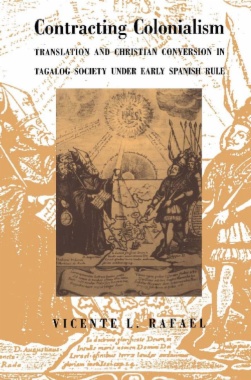In an innovative mix of history, anthropology, and post-colonial theory, Vicente L. Rafael examines the role of language in the religious conversion of the Tagalogs to Catholicism and their subsequent colonization during the early period (1580–1705) of Spanish rule in the Philippines. By tracing this history of communication between Spaniards and Tagalogs, Rafael maps the conditions that made possible both the emergence of a colonial regime and resistance to it. Originally published in 1988, this new paperback edition contains an updated preface that places the book in theoretical relation to other recent works in cultural studies and comparative colonialism.
- Contents
- Preface to the Paperback Edition
- Preface (1988)
- Introduction: Fishing Out the Past
- Chapter 1. The Politics of Translation
- Language and Empire
- Dominating the Vernacular
- The "Failure" of Native Writing
- Chapter 2. Tomas Pinpin and the Shock of Castilian
- Syncopating Language
- Counting and the Evasion of Grammar
- Gambling on Castilian
- Chapter 3. Conversion and the Demands of Confession
- The "Inadequacies" of Tagalog Conversion
- Reducing Native Bodies
- Confession and the Logic Conversion
- Chapter 4. Untranslatability and the Terms of Reciprocity
- Rereading Christianity
- The Imperative of Indebtedness: Utang na Loob and Hiya
- Chapter 5. Translating Submission
- Person and Status in Precolonial Society
- The Reach of Imperial Patronage
- Conversion and the Ideology of Submission
- Chapter 6. Paradise and the Reinvention of Death
- Generalizing Servitude
- Visualizing the "Outside"
- Spirits and the Appeal of Christianity
- Desiring a Beautiful Death
- Afterword: Translation and the Colonial Legacy
- Bibliography
- Index

